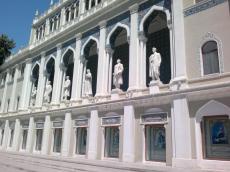|
|
TODAY.AZ / Arts & Entertainment
Azerbaijan's library science
28 February 2020 [15:10] - TODAY.AZ

By Azernews
By Laman Ismayilova
A room without books is like a body without a soul
Marcus Tullius Cicero
A book is like a best friend who will never walk away from you. It helps you to answer the most Important questions in your life. Reading books give us a chance to immense into the wonderful world of knowledge. They can bring joy to our lives.
Back in the times when paper did not exist, in ancient Egypt, books were written on papyrus.
The sacred book of the fire-worshipers "Avesta" was written before our era on the skin of twelve thousand cows.
As is known from history, Albanian alphabet consisting of 52 letters were prepared in the 5th century AD.
Many books were translated into the Albanian language, and small libraries were collected at schools and churches.
The library science in Azerbaijan stepped into the stage of a turning point in the 11th century.
The creation of many libraries in the country has been associated with a number of prominent persons.
Abulhasan Bahmanyar, philosopher and a student of Ibn Sina, played a major role in the development of librarianship in Azerbaijan.
Bahmanyar’s private library was considered one of the most beautiful libraries of that time.
This library was full of books and Bahmaniyar turned it into the center of the scholars’ exchange of ideas.
One of the main places in the library was occupied by the books of Bahmanyar himself.
The Book of Education translated into Arabic and Farsi brought him a great fame not only in Azerbaijan, but throughout the world.
One of the Persian duplicates copied in following years is kept in the Institute of Oriental Studies named after Biruni in Uzbekistan, while Arabic manuscript copies of the work are being protected in a number of libraries around the world in Beirut, Istanbul, Cairo, London and Vatican City.
He also established libraries in Tabriz, Gazaniya and other cities. In the city of Rashidiya named after him in the north-west of Tabriz there were two libraries, as well as a library as part of the university.
It is also difficult to overestimate the importance of the works of Nasreaddin Tusi in the matter of preserving and transmitting to future generations samples of the Azerbaijani and world books.
Tusi had arranged a library in the Maragha observatory built by order of Hulaki khan. The library stored over four hundred thousand books.
Nowadays, libraries and publishing houses in Azerbaijan are of great importance. There are also over 150 publishing houses that are engaged in printing.
The Mirza Fatali Akhundov National Library of Azerbaijan is a central state library of Azerbaijan. Its facades feature the statues of various writers and poets: Nizami Ganjavi, Mahsati, Uzeyir Hajibeyov, Shota Rustaveli, Alexander Pushkin and several others.
Founded in 1922, the library houses books, printed materials, newspapers, maps, dissertations and records. The hall has been provided with alphabetical catalogs of the books in different languages. The rare books, as well as the books about Azerbaijan covering the period until 1920 are stored in the rare book and library museum.
The country is also home to the Museum of Miniature Books. Located within the oldest part of Baku city - Icherisheher, the museum is included in the Guinness Book of Records as the museum with the largest number of miniature books.
The museum opened its doors in 2002 and owns one of the world's great collections of miniature books.
The creator of the museum, Zarifa Salakhova has made a unique contribution to the world of small books.
The main objective for the establishment of the Museum was to revive love for books among the youth.
One of the world’s first miniature books museums is home to over 6,500 books published in 71 countries.
The collection contains "Flower Alphabet", "Pictures of English History", Pushkin’s "Yevgeni Onegin", "La Fontaine Fables" and the 24-volume "One Thousand and One Nights" a seminal work in Arabic literature.
URL: http://www.today.az/news/entertainment/191523.html
 Print version
Print version
Connect with us. Get latest news and updates.
See Also
- 28 April 2025 [15:22]
Uzeyir Hajibayli's legacy highlighted at scientific and practical conference - 28 April 2025 [14:38]
Republican Youth Library presents virtual exhibition in honor of Academician Zarifa Aliyeva - 28 April 2025 [13:25]
Young opera stars shine at 2nd Fidan Hajiyeva's Int'l Opera Festival - 28 April 2025 [11:47]
Ganja State Philharmonic presents new project "The Power of Words" - 28 April 2025 [10:44]
Magical journey through centuries in Baku -opera time machine - 28 April 2025 [08:00]
Children's Art Festival qualifying round is underway - 27 April 2025 [21:17]
Culture Ministry: Enrollment for music and arts schools now open electronically - 27 April 2025 [18:00]
Azerbaijani delegation participates in Turkic World Cultural Forum - 27 April 2025 [13:43]
Carpet Museum to host Battle of Champion in Rapid and Blitz - 26 April 2025 [16:20]
Dubai hosts live solo exhibition by Azerbaijan’s 1st AI artist "Shusha"
Most Popular
 Pakistan warns of danger of "all-out war" as Kashmir crisis escalates
Pakistan warns of danger of "all-out war" as Kashmir crisis escalates
 Austria’s OMV shuts down hydrogen filling station network due to ‘lack of demand’
Austria’s OMV shuts down hydrogen filling station network due to ‘lack of demand’
 Azerbaijan and Pakistan FMs hold phone conversation on strategic partnership & regional security
Azerbaijan and Pakistan FMs hold phone conversation on strategic partnership & regional security
 South Korea ask United States to exempt its goods from duties
South Korea ask United States to exempt its goods from duties
 Biophysics Institute holds scientific seminar
Biophysics Institute holds scientific seminar
 Azerbaijan’s bold play: From Belt and Road passageway to global business hub [ANALYSIS]
Azerbaijan’s bold play: From Belt and Road passageway to global business hub [ANALYSIS]
 President Ilham Aliyev gives interview to China's CGTN television channel in Beijing
President Ilham Aliyev gives interview to China's CGTN television channel in Beijing
